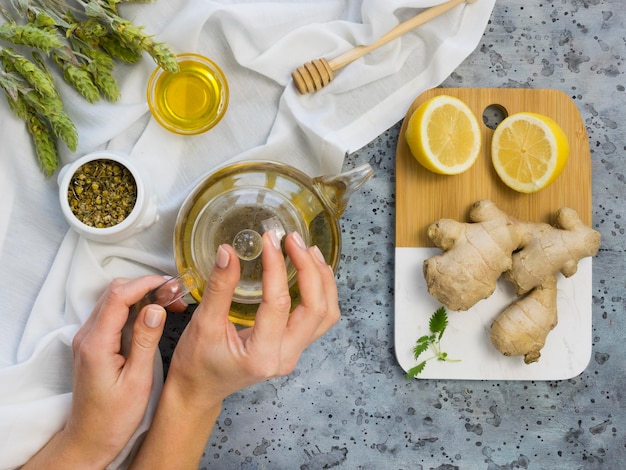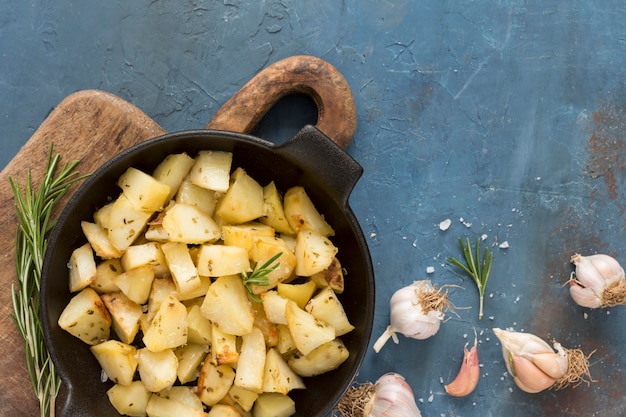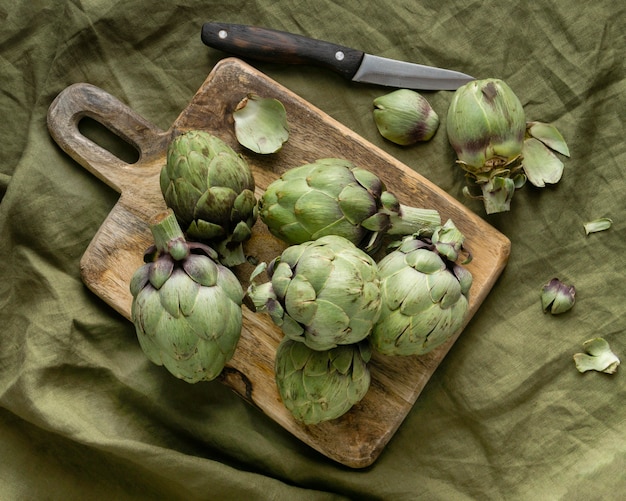Right, so you've got these knobbly little things in your fridge, and you're wondering what on earth to do with them. You've heard they're good for you, that they're a bit like a potato, but with a bit more… oomph. I've been there, my friend. Honestly, I used to think Jerusalem artichokes were some kind of culinary mystery. But trust me, once you get to know them, you'll be adding them to your shopping list on the regular.
Those lumpy, earthy tubers are actually packed with flavour and nutrients, and they're surprisingly versatile in the kitchen. From creamy soups to hearty salads, these little root vegetables can be cooked up in all sorts of delicious ways. Don't let their odd appearance deter you – they're just waiting to be discovered!
So, put on your apron, grab your chopping board, and let's explore the world of Jerusalem artichoke recipes together! We'll delve into the best ways to prepare them, and I'll share some of my favourite recipes that'll have you saying, "Oh, these are actually rather good!" You might even become a Jerusalem artichoke convert, like I did.
(Part 1) What Are Jerusalem Artichokes?

A Bit of History
You know how sometimes you see a name and you're just like, "Wait, what? How does that make sense?" Well, that's definitely the case with Jerusalem artichokes. First things first, they're not actually from Jerusalem. They're native to North America, and they were introduced to Europe by the Spanish in the 16th century. The "Jerusalem" part of their name is a bit of a mystery, but it's thought to be a corruption of the Italian word "girasole," which means sunflower. And that's important because Jerusalem artichokes are actually related to sunflowers!
Imagine a sunflower, towering tall in a field, with its golden head turning towards the sun. Now picture the roots beneath the surface – that's where the Jerusalem artichoke grows. It's a fascinating link, isn't it? Who would have thought those knobbly tubers were connected to such a beautiful flower?
The Lowdown on the Jerusalem Artichoke
So, let's break it down: Jerusalem artichokes are the edible tubers of the Helianthus tuberosus plant, which, as I mentioned, is related to sunflowers. They're a bit like potatoes in texture, but with a slightly nutty and sweet flavour. They're also a good source of fibre, potassium, and vitamin C.
One thing that makes Jerusalem artichokes interesting is their inulin content. Inulin is a type of prebiotic fibre that helps to feed the good bacteria in your gut. This can be a real bonus for your overall health and digestion. But, it can also have a bit of a side effect. If you're not used to eating Jerusalem artichokes, they can make you… a bit gassy. Don't worry, it's not a problem if you eat them in moderation and gradually increase your intake. And hey, at least you're getting your daily dose of gut-friendly fibre!
(Part 2) Choosing and Storing Jerusalem Artichokes

Picking the Perfect Artichokes
You'll find Jerusalem artichokes in the vegetable section of most supermarkets, especially in the autumn and winter months. When you're picking them, look for firm, smooth tubers that are free of blemishes. They should feel heavy for their size and have a slightly earthy aroma. Avoid any that are soft, wrinkled, or have signs of damage. It's also worth noting that they come in different shapes and sizes – just go for the ones that look best to you.
Think of it like choosing a good apple: you want one that feels solid and has a healthy glow. The same goes for Jerusalem artichokes!
Stashing Away Your Artichokes
Jerusalem artichokes are best stored in a cool, dark, and dry place, like a pantry or basement. Don't store them in the fridge, as they'll start to get soft and lose their flavour. If you're planning on using them within a few days, you can keep them in a cool, dry place in your kitchen.
Just like a good bottle of wine, Jerusalem artichokes appreciate a bit of time to rest and develop their flavours. So, give them a comfortable place to settle in, and they'll reward you with their deliciousness.
(Part 3) Preparing Jerusalem Artichokes for Cooking

Alright, so you've got your artichokes and you're ready to cook! But first, you'll need to give them a little prep. It's not exactly rocket science, but there are a few things to keep in mind.
Scrubbing and Trimming
The first step is to give them a good scrub. You can use a vegetable brush or just wash them under running water. Then, trim off any damaged or discoloured parts with a knife. You can leave the skin on or peel it off, it's up to you! The skin is edible and adds a bit of texture, but if you're not keen on it, go ahead and peel it.
Think of it like washing a potato. A good scrub removes any dirt or grit, and trimming the ends ensures you're only working with the freshest parts.
Cutting and Chopping
Now, you'll need to cut them into bite-sized pieces. You can slice them thinly, chop them into cubes, or cut them into wedges. It really depends on the recipe you're making. If you're making soup, you can cut them into chunks. If you're roasting them, you can cut them into wedges. And if you're adding them to a salad, you might want to slice them thinly.
Remember, size matters! Cut them into pieces that are easy to eat and that will cook evenly. And don't be afraid to get creative with your chopping technique.
(Part 4) Cooking Methods for Jerusalem Artichokes
Now that you've got your artichokes prepped and ready to go, let's talk about cooking methods. There are so many different ways to cook them, and each method brings out a different aspect of their flavour.
Roasting
Roasting Jerusalem artichokes is one of my favourite ways to cook them. It brings out their natural sweetness and creates a delicious caramelized texture. Just toss them with some olive oil, salt, and pepper, and roast them in a preheated oven at 400°F (200°C) for about 20-30 minutes, or until they're tender and slightly golden brown.
The oven's dry heat draws out the sweetness of the artichokes, and the caramelization adds a delightful depth of flavour. It's a simple technique that delivers big results.
Boiling
Boiling Jerusalem artichokes is a simple and quick method, and it's a good starting point if you're not sure how to cook them. Just add them to a pot of boiling water and cook them for about 10-15 minutes, or until they're tender. You can then use them in soups, stews, or salads.
Think of boiling as the foundation for other dishes. It helps to soften the artichokes and makes them easier to blend or chop for further cooking.
Frying
If you're looking for a bit more flavour and texture, try frying Jerusalem artichokes. Simply heat some oil in a pan over medium heat and add the artichokes. Cook them for about 5-7 minutes, or until they're golden brown and crispy. You can then serve them as a side dish or add them to a stir-fry.
Frying gives the artichokes a wonderful crispy exterior and adds a satisfying crunch. It's a great way to elevate their flavour and create a delicious contrast in textures.
Sautéing
Sautéing is another great way to cook Jerusalem artichokes, and it's a quick and easy method for adding them to a meal. Just heat some butter or oil in a pan over medium heat and add the artichokes. Cook them for about 5-7 minutes, or until they're tender and slightly browned. You can then add them to soups, stews, or pasta dishes.
Sautéing allows for quick cooking and a delicate browning, which enhances the artichoke's natural flavours. It's a versatile technique that works well for both savoury and sweet dishes.
(Part 5) Delicious Jerusalem Artichoke Recipes
Right, let's get down to the good stuff - the recipes! I've got a few tried-and-true favourites that I want to share with you. These are perfect for a quick weeknight meal, a special occasion, or just a simple and healthy lunch. Get ready to be amazed by the versatility of this humble root vegetable!
Jerusalem Artichoke Soup
This is a classic for a reason! It's creamy, comforting, and absolutely delicious. You can make it with or without cream, depending on your preference. Here's a simple recipe:
Ingredients:
- 1 lb (450 g) Jerusalem artichokes, peeled and chopped
- 1 onion, chopped
- 2 cloves garlic, minced
- 4 cups (946 ml) vegetable broth
- 1/2 cup (118 ml) heavy cream (optional)
- Salt and pepper to taste
- Fresh parsley or chives for garnish (optional)
Instructions:
- In a large pot or dutch oven, sauté the onion and garlic in olive oil until softened.
- Add the Jerusalem artichokes and vegetable broth. Bring to a boil, then reduce heat and simmer for 20-30 minutes, or until the artichokes are tender.
- Using an immersion blender or a regular blender, purée the soup until smooth.
- Stir in the cream (if using) and season with salt and pepper to taste.
- Serve hot, garnished with fresh herbs if desired.
This soup is a fantastic way to use Jerusalem artichokes, and it's a perfect meal for a chilly evening. The artichoke flavour blends beautifully with the broth and spices, creating a truly comforting and delicious soup.
Roasted Jerusalem Artichokes with Garlic and Herbs
This recipe is so simple, yet so flavourful. The roasted artichokes are sweet and slightly nutty, and the garlic and herbs add a lovely aromatic touch.
Ingredients:
- 1 lb (450 g) Jerusalem artichokes, scrubbed and cut into wedges
- 2 cloves garlic, minced
- 2 tablespoons olive oil
- 1 tablespoon chopped fresh rosemary
- 1 tablespoon chopped fresh thyme
- Salt and pepper to taste
Instructions:
- Preheat oven to 400°F (200°C).
- In a large bowl, toss the artichokes with the garlic, olive oil, rosemary, thyme, salt, and pepper.
- Spread the artichokes in a single layer on a baking sheet.
- Roast for 20-30 minutes, or until they're tender and slightly golden brown.
- Serve hot as a side dish or as part of a main meal.
These roasted artichokes are a wonderful side dish for any roast or grilled meat. They also pair beautifully with roasted vegetables, like carrots, parsnips, and sweet potatoes.
Jerusalem Artichoke and Apple Salad
This salad is a beautiful combination of textures and flavours. The sweet and crunchy artichokes go so well with the tangy apple and the creamy dressing.
Ingredients:
- 1 lb (450 g) Jerusalem artichokes, thinly sliced
- 1 apple, cored and thinly sliced
- 1/2 cup (60 g) crumbled feta cheese
- 1/4 cup (60 ml) olive oil
- 2 tablespoons lemon juice
- 1 tablespoon Dijon mustard
- Salt and pepper to taste
- Fresh parsley for garnish (optional)
Instructions:
- In a large bowl, whisk together the olive oil, lemon juice, and Dijon mustard. Season with salt and pepper to taste.
- Add the Jerusalem artichokes, apples, and feta cheese to the bowl. Toss to coat.
- Serve immediately or chill for later.
- Garnish with fresh parsley if desired.
This salad is a perfect light lunch or a side dish for a summer barbecue. It's fresh, flavourful, and incredibly easy to make.
Jerusalem Artichoke and Walnut Pesto
This pesto is a delicious and unique twist on the classic. The nutty flavour of the artichokes blends perfectly with the walnuts and basil.
Ingredients:
- 1 cup (120 g) Jerusalem artichokes, cooked and mashed
- 1/2 cup (60 g) walnuts
- 1/2 cup (60 g) fresh basil leaves
- 1/4 cup (60 ml) olive oil
- 2 cloves garlic, minced
- Salt and pepper to taste
- Lemon juice to taste (optional)
Instructions:
- In a food processor, combine the mashed Jerusalem artichokes, walnuts, basil, olive oil, garlic, salt, and pepper. Pulse until finely chopped and combined.
- Add a squeeze of lemon juice if desired.
- Serve immediately or store in an airtight container in the refrigerator for up to 3 days.
This pesto is a fantastic topping for pasta, grilled chicken, or fish. It's also delicious spread on toasted bread or crackers.
Jerusalem Artichoke and Goat Cheese Fritters
These fritters are a great appetizer or side dish. They're crispy on the outside and soft and cheesy on the inside.
Ingredients:
- 1 cup (120 g) Jerusalem artichokes, grated
- 1/2 cup (60 g) goat cheese
- 1/4 cup (30 g) all-purpose flour
- 1 egg, beaten
- 1/4 cup (60 ml) milk
- 1 teaspoon chopped fresh thyme
- Salt and pepper to taste
- vegetable oil for frying
Instructions:
- In a large bowl, combine the grated Jerusalem artichokes, goat cheese, flour, egg, milk, thyme, salt, and pepper. Mix well.
- Heat a generous amount of vegetable oil in a large skillet over medium heat.
- Drop spoonfuls of the batter into the hot oil, cooking for 2-3 minutes per side, or until golden brown and crispy.
- Remove the fritters from the pan and drain on paper towels.
- Serve immediately.
These fritters are best served hot and crispy, and they're perfect with a dollop of sour cream or a side of salad.
(Part 6) Beyond the Kitchen: The Health Benefits of Jerusalem Artichokes
Okay, so we've talked about how delicious Jerusalem artichokes are, but did you know they're also good for you? They're packed with nutrients and have a bunch of health benefits. Let's take a closer look!
A Good Source of Fibre
Jerusalem artichokes are a great source of fibre, which is important for digestive health. Fibre helps to keep you feeling full, regulate your blood sugar levels, and support a healthy gut microbiome.
Fibre is a vital component of a healthy diet, and Jerusalem artichokes deliver a good dose of it. It's like a natural broom that sweeps through your digestive system, keeping things moving smoothly.
Rich in Prebiotic Fibre
As I mentioned before, Jerusalem artichokes are particularly rich in inulin, a type of prebiotic fibre. Prebiotics are a type of fibre that acts as food for the beneficial bacteria in your gut. These bacteria play a crucial role in maintaining good digestive health, boosting your immune system, and even supporting your mental well-being.
Think of prebiotics as fuel for your gut's good bacteria, helping them to thrive and keep your digestive system in tip-top shape. It's like giving them a healthy snack that keeps them happy and working hard for you.
Low in Calories and Fat
Jerusalem artichokes are relatively low in calories and fat, which makes them a good choice for those who are watching their weight. They're also naturally sweet, so they can be a satisfying alternative to sugary snacks.
If you're looking for a healthy and satisfying snack or side dish, Jerusalem artichokes are a great option. They're a good way to get your fill of nutrients without adding a lot of extra calories or fat.
May Help Control Blood Sugar Levels
Studies have shown that Jerusalem artichokes can help to improve blood sugar control, particularly in people with type 2 diabetes. The inulin content helps to regulate the absorption of glucose, which can help to stabilize blood sugar levels.
This is an important benefit for people with diabetes, as it can help to manage their blood sugar levels and improve their overall health.
May Support Heart Health
Some research suggests that Jerusalem artichokes may have beneficial effects on heart health. They're rich in potassium, a mineral that's important for maintaining healthy blood pressure. They're also a good source of antioxidants, which can help to protect your heart from damage.
This makes Jerusalem artichokes a heart-healthy addition to your diet. They can help to maintain healthy blood pressure and reduce the risk of heart disease.
(Part 7) Handling the "Gassy" Factor
Alright, let's address the elephant in the room. Yes, Jerusalem artichokes can sometimes cause gas and bloating, especially if you eat a large amount of them at once. But don't let that put you off! There are a few things you can do to minimize this effect.
Start Small
The best way to avoid gastrointestinal discomfort is to start by eating small amounts of Jerusalem artichokes. Gradually increase your intake over time, and your body will get used to the inulin.
It's all about introducing your body to this unique type of fibre slowly and steadily. Think of it like training for a marathon: start with a short walk and gradually increase the distance until you can handle a full run.
Cook Them Well
Cooking Jerusalem artichokes can help to reduce their inulin content, which can make them easier to digest. Make sure they're cooked thoroughly before eating them.
Just like with other vegetables, cooking Jerusalem artichokes helps to break down the fibre, making it easier for your body to digest. It's a simple step that can make a big difference.
Combine Them with Other Foods
Adding Jerusalem artichokes to dishes that contain other foods, like soups, stews, or salads, can help to dilute the inulin content and make them less likely to cause gas.
Think of it like blending a strong flavour with other ingredients to create a more balanced taste. This helps to spread out the inulin, making it less concentrated and easier to digest.
Don't Be Afraid to Experiment
Everyone's digestive system is different, so you may need to experiment a little to find what works best for you. Try different cooking methods and recipes to see what you tolerate well.
Don't be discouraged if the first few times you try Jerusalem artichokes, you experience some discomfort. Keep experimenting, and you'll find ways to enjoy them without any side effects.
(Part 8) FAQs: Your Jerusalem Artichoke Questions Answered
1. What does a Jerusalem artichoke taste like?
Jerusalem artichokes have a slightly nutty and sweet flavour with a hint of earthiness. Their flavour is often compared to artichokes, although they are not related. They have a texture similar to potatoes, but with a bit more firmness.
2. Are Jerusalem artichokes good for you?
Yes, Jerusalem artichokes are a good source of fibre, potassium, and vitamin C. They also contain inulin, a type of prebiotic fibre that is beneficial for gut health. They're low in calories and fat, making them a healthy addition to your diet.
3. How do I cook Jerusalem artichokes?
You can cook Jerusalem artichokes in a variety of ways, including roasting, boiling, frying, and sautéing. They can be added to soups, stews, salads, and pasta dishes, or served as a side dish.
4. What happens if you eat too many Jerusalem artichokes?
If you eat too many Jerusalem artichokes, you may experience gas, bloating, and stomach discomfort. This is because of the inulin content, which can be difficult for some people to digest. It's best to start with small amounts and gradually increase your intake as your body gets used to it.
5. Where can I buy Jerusalem artichokes?
You can find Jerusalem artichokes in the vegetable section of most supermarkets, especially during the autumn and winter months. They're also sometimes available at farmers markets.
So there you have it! The world of Jerusalem artichokes is yours to explore. Go on, give them a try. You might just discover a new favourite vegetable!
Everyone is watching

Prime Rib Roast Cooking Time Chart: Per Pound Guide
Cooking TipsPrime rib roast. Just the name conjures images of lavish dinners, crackling fires, and hearty laughter. It’s ...

How Long to Bake Potatoes in the Oven (Perfect Every Time)
Cooking TipsBaked potatoes are a staple in my kitchen. They're incredibly versatile, delicious, and surprisingly easy to m...

Perfect Rice Every Time: The Ultimate Guide to Cooking Rice
Cooking TipsAs a self-proclaimed foodie, I've always been a bit obsessed with rice. It's the foundation of countless cuisi...

The Ultimate Guide to Cooking Asparagus: Tips, Techniques, and Recipes
Cooking TipsAsparagus. The mere mention of this spring delicacy conjures up images of vibrant green spears, crisp and burs...

Ultimate Guide to Cooking the Perfect Thanksgiving Turkey
Cooking TipsThanksgiving. Just the word conjures up images of overflowing tables laden with delicious food, the scent of r...
